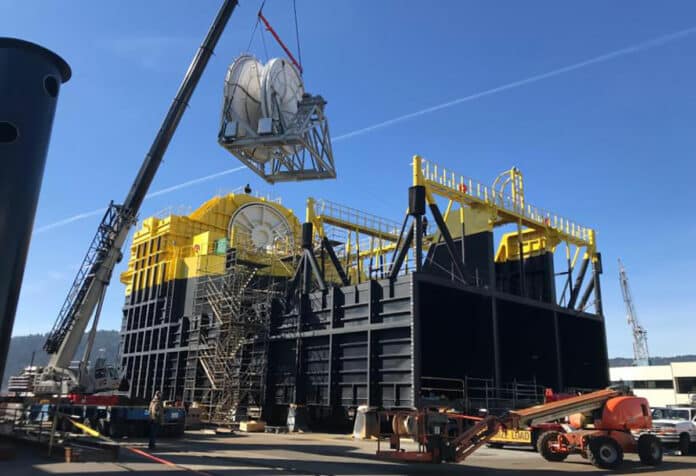OceanEnergy, an Irish commercial company developing wave energy technology, has signed onto a collaboration project with 14 partners across industry and academia in the UK, Ireland, France, Germany, and Spain to test the OE35 floating wave energy device at scale. Co-funded by the EU Horizon Europe Programme and Innovate UK, the €19.6 million WEDUSEA project aims to be the stepping stone towards large-scale wave energy commercialization.
The OE35 is billed as the world’s largest capacity floating wave energy device. Floating on the ocean’s surface, the device incorporates a trapped air volume, with the lower part open to the sea. The wave pressures at the submerged opening cause the water to oscillate and drive the trapped air through a turbine to generate electricity. This energy can be exported to the grid or used in other offshore applications.
The new WEDUSEA project will demonstrate a grid-connected 1MW OE35 floating wave energy converter at the European Marine Energy Centre Test Site in Orkney, Scotland. The project will proceed in three phases over four years.
The first phase is the initial design of a device suited to the European Marine Energy test site’s ocean conditions. This will be followed by the installation and demonstration at the site, lasting two years. The final phase will be commercialization and dissemination, which sees the capitalization and exploitation of the results. OceanEnergy and other consortium companies will actively exploit the results through new innovations, products, and services.
“The innovative actions are taken in this program aim to improve the efficiency, reliability, scalability, and sustainability of wave energy technology and reduce the Levelised Cost of Electricity of the technology by over 30%. This will help to de-risk investments in wave energy,” said Myles Heward, Project Manager at the European Marine Energy Center.
“We are expecting WEDUSEAm to take away energy beyond state of the art by the collaboration of partners with a multi-disciplinary background and that it will contribute to the deployment of arrays of reliable wave energy devices to achieve the 1GW target for 2030 as presented in our Offshore Renewable Energy Strategy,” says Matthijs Soede from the European Commission. “The current energy crisis shows that the use of multiple energy sources is important to improve the security of supply, and a breakthrough in ocean energy would be welcome.”
